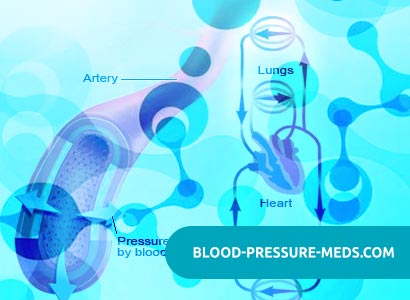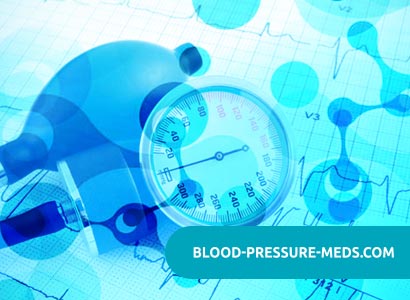High Blood Pressure or Hypertension – Causes, Symptoms and Complications
High blood pressure is one of the common health problems of today. According to survey 1 out of every 3 adults has high blood pressure. Another study has shown that about 33.4 percent of men have high blood pressure condition and 30.7 percent of women suffer from high blood pressure.
The major cause of the high percentage of people with high blood pressure is due to unhealthy habits. Today we rely more on processed or commercially produced food and diet as compared to the naturally and organically grown food.

High Blood Pressure is associated with many health problems and it can also complicate or worsen the health problem. Therefore it is necessary to know about the symptoms, signs, causes, and precaution for high blood pressure.
Overview:
High Blood Pressure is also known as Hypertension is a disease in which the blood pressure of a person increases from the normal blood pressure. In case of high blood pressure, the pressure of blood is greater than 120/80 mmHg. The longer period of high blood pressure can cause severe damage to the blood vessels, heart and even can cause stroke or hemorrhage.
If your blood pressure is 140/90 mm Hg or even higher than this level on different days of a week or over a number of weeks it means you have high blood pressure or hypertension problem.
It is not necessary that both upper and lower blood pressure increases in high blood pressure. Even increases in either one of blood pressures mean you have high blood pressure. Usually, people who have high blood pressure or hypertension has an increase in upper blood pressure (higher than 120 mmHg).
What Happens in High Blood Pressure?
When the blood pressure increases from the normal 120/80 mmHg blood exert a greater force on the blood vessels. As a result of this increased force or pressure, the inner lining or walls of the arteries and veins gets damaged and making them susceptible to various artery diseases.
Higher blood pressure means an extra strain or force on your heart. In this situation, the heart has to work harder as compared to a normal situation and as a result, there is a high risk of heart muscle and tissue damage. As a result of this strain or extra force, the heart is likely to have heart failure or cardiac arrester both of the situations are life-threatening.
If someone has high blood pressure and also other health problems such as diabetes (high blood sugar level) or high cholesterol or obesity, such persons have a risk of sudden death caused by brain stroke, hemorrhage or cardiac arrest.
High blood pressure is not for our kidney either. Moreover, hypertension can cause serious harm to a pregnant woman or the baby. If high blood pressure does not prevent or lowered to normal blood pressure it can cause stillbirth or abortions.
What are the Causes of Hypertension/ High Blood Pressure?
There are a number of causes and risk factors of hypertension or high blood pressure but one major cause of high blood pressure is the diet or food that we eat. Moreover, our other habits also contribute to causing high blood pressure.
The possible cause of high blood pressure includes:
- Eating too much salt
- Not eating enough fruits and vegetables
- Lack of exercise and physical activity
- Obesity and overweight
- Excessive alcohol consumption
- Smoking tobacco
- Use of drugs such as cocaine etc.
- These are the factors or causes which one can control to avoid high blood pressure risks.
Additional causes of high blood pressure:
In addition to the above causes, there are some other factors which can because develop high blood pressure or hypertension. These factors are beyond our control. But with a proper and healthy lifestyle, one can decrease the risk of high blood pressure.
- Age - The older you get, the more likely you are to develop high blood pressure. Also, the risk of high blood pressure is higher in persons who have an unhealthy lifestyle.
- Gender – sex or gender is also a risk factor of high blood pressure or hypertension. High blood pressure is more common among adult males as compared to adult females.
- Family History – People who have a family history of high blood pressure are likely to develop hypertension.
- Medical Conditions – In some cases, the cause of hypertension is due to another medical condition. Some people have health problems such as kidney problems are more likely to develop high blood pressure.
Symptoms or Warning Signs of Hypertension:
Usually, there are no warning signs and symptoms for high blood pressure. The only way to know about whether your blood pressure is high or not is through blood pressure measurement. Further a single high reading of the blood pressure does not mean that you are patient of high blood pressure.
To make sure whether you have hypertension you need to take multiple reading at different interval of a day.

Some signs or symptoms of hypertension would be headaches, high pulse rate, breathlessness, raised body temperature etc. but these signs does not strictly indicate towards high blood pressure.
How to Prevent High Blood pressure?
It is not possible to prevent or treat high blood pressure without proper monitoring. The first step in controlling the blood pressure is to monitor and check your blood pressure regularly. There are other ways to prevent or control your high blood pressure condition. These precautions or preventive measure requires consistency and determination if you want to overcome hypertension.
- Limit the Use of Salt: Salt is considered as one of the triggering factors for increasing the blood pressure. It is observed that people who have high salt consumption have a high risk of hypertension and blood pressure as compared to people who use a moderate level of salt.
- Eat More Vegetables and Fruits: Fruits and vegetables contain many nutrients and soluble fibers which are good for human health. These fruits and vegetables regulate the normal circulation of blood in our body and improve our heart health. Moreover, the vegetables also keep our blood pressure in control and hence lowers the risk of other health problems which are linked to high blood pressure.
- Start Exercise: Physical activity like brisk walking, jogging, running, swimming or cycling and exercise help to lower the risk of many health problems including high blood pressure.
- Maintain a Healthy Weight: A healthy weight means neither overweight nor underweight. Both overweight and underweight plays a role in disturbing the normal blood pressure. Overweight or obesity is one of the causes of developing high blood pressure.
- Avoid Excessive Consumption of Antioxidants: If you have blood pressure or hypertension, then taking antioxidants such as green tea may disturb the blood pressure even more. People with hypertension are recommended to limit the use of green teas.
Some other ways to improve your blood pressure include:
- Quitting Smoking
- Limiting the daily alcoholic consumption
- Avoiding processed and oily food
- Managing your cholesterol
- Controlling the blood sugar level
Preeclampsia
About 5 to 8 percent of pregnant women have a condition known as preeclampsia. It is a rare condition which usually develops on or after the 2oth week of pregnancy. In very rare cases preeclampsia develops during early pregnancy phase or postpartum.
The symptoms of preeclampsia include high blood pressure, liver or kidney problems, headaches, sudden weight gain, and swelling. Preeclampsia can cause serious health problems or even fatal maternal deaths. About 13% of women die due to preeclampsia.
Preeclampsia is often misunderstood with the hypertension or high blood pressure and therefore many women does not take serious preventive measure. The ignorance may result in serious consequences for both the mother and child.
Although women who take birth control pills may experience a slight increase in their pressure this is different from preeclampsia. Also, such women may experience high blood pressures during their gestation period.
What to do If Someone has Hypertension or High Blood Pressure:
If you or anyone who suffers from high blood pressure it is important to consult your general physician and take regular reading and measurements of your blood pressure. The next step is to change your lifestyle from unhealthy and improper diet plan to a healthy and balanced diet, which contains more soluble fibers, less saturated fats and low in salt ratio.
Moreover, medications for treating hypertension are also available in the market. But these medications should only to be used on the prescription of your doctor. The dosage and amount of the medication are only to be determined by the doctor.
The medication, its dosage and amount vary for person to person use to age factor and severity of the disease.
For the person who is under 55 years of age – Such persons are usually recommended to take ACE inhibitors such as enalapril, lisinopril, perindopril, and ramipril, or an Angiotensin-2 receptor blocker (ARB), including candesartan, irbesartan, losartan, valsartan, and olmesartan.
For the person who is 55 or above 55 years of age – This age group is recommended a calcium channel blocker medications or drugs, such as amlodipine, felodipine, nifedipine, diltiazem, and verapamil.
It is advised to take your medication regularly and at a proper time. Usually, people with a condition of hypertension are required to take medications throughout their lifetime. If due to some reason you miss your medication do not take double dosage on the next day. Also, do not take this medication on irregular time.
 AU
AU UK
UK CA
CA DE
DE FR
FR IT
IT ES
ES



